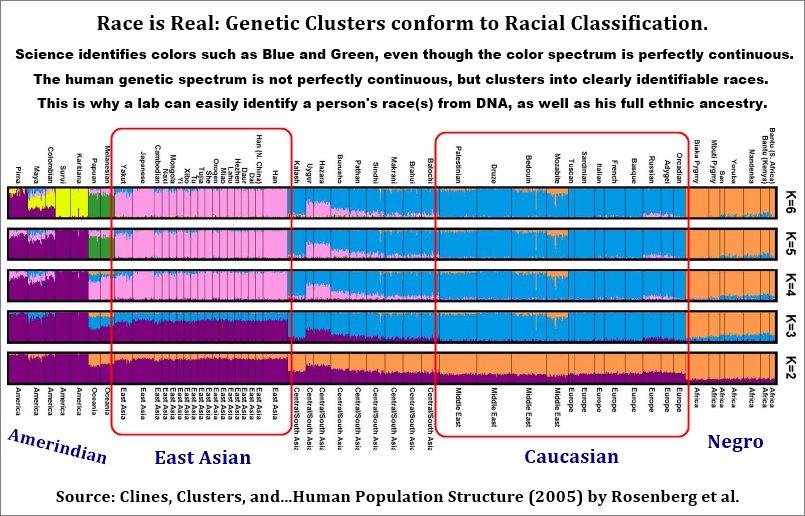o_O.Q said:
sundin13 said:
Wikipedia is not a stand in for actual scientific articles. I could also go further and say, the unsupported opinion of some within the scientific community does not overwrite the supported claims of others, just because they more conveniently fit into your worldview.
"There are two evolutionary theoretical criteria for naturally objective groupings of biological organisms. These are common ancestry and degree of similarity (Mayr and Bock, 2002; Schuh and Brower, 2009; Wiley and Lieberman, 2011; Templeton, 2013). Phylogenetic systematics and Darwinian/evolutionary taxonomy use “common descent” as a criterion for biological classification but the similarity criterion is used only in the latter. Systematics and evolutionary classification are concerned with organic diversity and evolutionary relationships. The assumptions underlying the primary use of neutral markers in human genetic diversity studies suggest that their objective biological meaning needs to be evaluated based on the above two criteria. Yet as researchers increasingly point out, the debate is “free floating” to the extent that what counts as “biological reality” of human races is elusive, ranging from “trivial” to “obscure,” and often construed in a non-Darwinian biological framework (Cavalli-Sforza, 2000; Cooper et al., 2003; Graves, 2011; Maglo, 2011)."
"Accordingly, a taxon of organisms may be said to have an objective independent biological existence in Darwinian classification if either of the following two conditions obtains: (1) It constitutes a phylognetic clade by comprising all, but only all, the descendants of its originating biological common ancestor (Templeton, 1998, 2013; Schuh and Brower, 2009; Claridge, 2010; Mishler, 2010; Maglo, 2011; Wiley and Lieberman, 2011); and/or (2) It has reached a degree of genetic differentiation deemed taxonomically meaningful in system biology (Mayr and Bock, 2002; Keita et al., 2004; Graves, 2011). Thus, it follows from these evolutionary theoretical constraints that races must be evolutionary distinct human subpopulations by virtue of (1) or (2) or some combination of both in order to be a valid biological category."
"In Darwinian classification (but also in phylogenetic systematics), a biological grouping of organisms that does not meet the above criteria is referred to as a wastebasket taxon. It is so called because it is evolutionary unordered and functions in science merely as a “warehouse kind” that taxonomically lumped together disparate organisms having no objectively definable evolutionary relationship. Wastebasket taxa lack natural reality (Parfrey et al., 2006; Schuh and Brower, 2009; Claridge, 2010; Mishler, 2010; Wiley and Lieberman, 2011) and granting them objective biological existence constitutes an erroneous attribution of ontological status called the fallacy of reification (Gannett, 2004, 2014; Duster, 2005; Glasgow, 2009; Maglo and Martin, 2012; Hochman, 2013)."
To assert the biological relevance of the classification of "human race", you must satisfy certain criteria relating to the genetics and ancestry of subpopulations. Without satisfying those criteria, you are simply bundling traits by convenience and committing the fallacy of reification by attempting to pass this off as a meaningfull biological division.
|
1) we share 96% of our genes with chimpanzees, how does that factor into your argument? i'd seriously like an answer on that
2) "the unsupported opinion of some within the scientific community does not overwrite the supported claims of others"
lol um are you really trying to push the argument that the consensus within the scientific community is not that race is about physical characteristics?
again i'll reiterate the terms causcasoid, negroid and mongoloid came from the scientific community and are accepted and taught as biological terms worldwide... what does that do for your argument?
you have to address that
3) "To assert the biological relevance of the classification of "human race", you must satisfy certain criteria relating to the genetics and ancestry of subpopulations."
and again this is not the definition of race
here is a biology encyclopedia
http://www.biologyreference.com/Ar-Bi/Biology-of-Race.html
|
1) 96% similar to chimpanzees:
This measurement is fundamentally different than measurements used to speak about diversity between humans. By this measure, humans are about 100% similar to each other, because this speaks of the similarities in the a more macroscale, looking at what genes are present. On the other hand, diversity between humans doesn't speak to the presence of genes, it speaks to the presence of alleles at those genes.
You could think of it kind of like the alphabet. Humans are the roman alphabet. You can make different words with this alphabet, but it all uses the same language. On the other hand, comparison between species would be like throwing in a few chinese characters, which makes the sequences uncompatible (that was a poor comparison, but its the best I can do off the top of my head).
2) The consensus within the scientific community from everything I've read is that race is essentially a "wastebasket taxa". It is something that has been used within many fields such as biology, and has largely been reified through use even though it lacks that solid genetic footing.
3) Here is a direct quote from your "encyclopedia on biology":
"Paleoanthropological evidence suggests that these units have been interbreeding between populations for at least the last two hundred thousand years or longer in what may once have been considered racial groups. More recently, molecular techniques have developed to examine genetic differences between individuals and populations, including karyotypes providing chromosomal number and patterns, deoxyribonucleic acid (DNA) hybridization, protein sequences, and nuclear and mitochondrial base sequences from ancient and modern DNA. From all this evidence, it is clear that populational, but not racial, differences do exist within the human species."
I repeat: It is clear that populational, but not racial, differences do exist within the human species.
To rephrase: Racial differences do not exist within the human species.
Here is some more:
"Early racial classification systems for humans used specific phenotypic characteristics that occurred in higher frequencies in certain populations. Initially, three classes were identified by anthropologists: Caucasoids, Mongoloids, and Negroids; later, Australoids and Capoids (Bushmen) were added. Following this, even more classifications were made, with no consensus among biological anthropologists. Difficulties with these early classification systems stem from the immense genotypic and phenotypic human variation found in modern living populations."
"Some genetic differences do exists between groups, but these by and large do not correspond to historical racial categories."
"Genetic diversity has resulted from the extensive hybridization that has occurred in the last two hundred thousand years, hiding any clear evidence for typological classification of race. Moreover, when selection pressures (temperature, altitude) are coupled with phenotypic variation, phenotypic expression defies taxonomic assignment of race. The genetic diversity within any historically defined race swamps the small amount of difference between such groups, making the boundaries of these categories entirely arbitrary. Therefore, race in humans does not have a biological meaning."
I don't think I've ever seen someone post a source which so thoroughly debunks their own point...
Last edited by sundin13 - on 22 February 2018








 ; - ) : - ) : - ( : - P : - D : - # ( c ) ( k ) ( y ) If anyone knows the shortcut for
; - ) : - ) : - ( : - P : - D : - # ( c ) ( k ) ( y ) If anyone knows the shortcut for ![]() , let me know!
, let me know!
























































